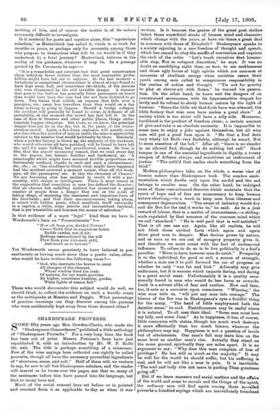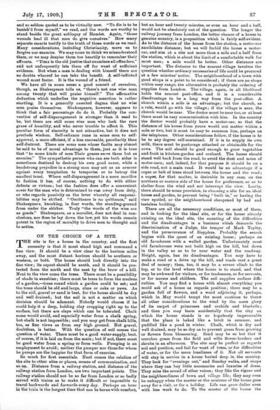SHAKESPEARE PROVERBS.
SOME fifty years ago Mrs. Cowden-Clarke, who made the "Shakespeare Concordance," published a little anthology of "Shakespeare Proverbs." For a very long time the book has been out of print. Messrs. Pritnam's Sons have just republished it, with an introduction by Mr. W. F. Rolfe (6s. net). The title is perhaps something of a misnomer. Few of the wise sayings here collected can rightly be called proverbs, though all have the necessary proverbial ingredients of "shortness, sense, and salt." Half of them will, we venture to say, be new to all but Shakespeare scholars, and the reader will marvel as he turns over the pages, not that so many of the sentences before him have passed into the language, but that so many have not.
'Much of the social counsel here set before us in pointed and succinct form is as applicable to-day as when it was
written. Is it because the genius of the great. poet strikea below those .superfieial strata of human mind and character which change with the years, Or have our times a gheat deal in common with those of Elizabeth ? Shakespeare speaks to a society rejoicing in a new freedom of thought and 81*(44 which has ceased to obey the snaffle of convention and requires the curb of the critic. "Let's teach ourselves that honour- able .stop, Not to outsport discretion," he sups. It was no doubt,an,unedifying sight then, as now, to see recklessness and those ugly forms of high spirits which, are common, at moments of ebullient energy when societies renew their youth among men. called to conspicuous responsibility in the realms of action and thought. "Tie not for gravity to play at cherry-pit with Satan," he warned his genera- tion. On the other hand, he knew well the dangers of an overstrained seriousness, with its hypersensitive disgust for levity and its refusal to study huinan nature by the light of humour. "Since the little wit that fools have was silenced, the little foolery that wise men have makes a great show." A society which is too strict will have a silly side. Moreover, hardihood is the product of freedom alone; a certain amount of give-and-take is an absolute necessity. It is impossible to some men to enjoy a joke against themselves, but all wise, men will put a good face upon it. "He that a fool doth very wisely bit Doti' very foolishly, although he smart, Not,' to seem seaselese of the bob." After all, "there is no slander in tui allowed fool, though he do nothing but rail." Good temper is one of the essential ingredients in dignity, a trusty weapon of defence always, and sometimes an instrument of
justice. The robb'd that smiles steals something from the thief."
Modern philosophers take, on. the whole, a worse view of human nature than Shakespeare took. The sombre senti- mentalism which dwells only upon the sordid and the sad belongs to smaller men. On the other hand, he indulged. none of those rose-coloured theories which maintain that the , spurs of hope and of „fear are unnecessary to keep human , nature climbing,—in a word, to keep men from idleness and consequent degeneration. "The sweat of industry would dry = and die But for the end it works to," he said. .As to. a just teward of labour, that is .a matter of circumetance,—a sliding scale regulated by that measure of the common mind which we call "standard." "He is well paid that is well satisfied." That is all one can say. Again, like all realists, he will not blink those unideal facts which again and again drive good men to despair. Man desires power by nature, and as soon as we are out of savagery property gives it, and therefore we must count with the fact of, undeserved influence.' To refuse to do so is to live politically in a fool's paradise. "Have is have, however men do catch." Prosperity is *to the indiiidual, for good or evil, a source of strength, • whether a than use it to pull forward the car of progress or whether be only "wax fat and kick." Adversity may give endurance, but it is success which imparts daring, and daring is a great Social asset. Unfortunately it is a quality occa- sionally found in men who would do less harm as cowards. Luck is a solvent alike of fear and caution. Now and then, too, it acts as a -corrosive upon conscience. "Winning," the wise man tells us, "will put any man into courage." The leisure of the few was in Shakespeare's eyes a fruitful thing for the many. "The hand of little employment bath the daintier sense," he said. Fastidiousness may be useful where' It is natural. To all men their ideal. "Some men must love my lady, and some Joan." As to happiness, it has, of course,
little connexion with status, though too much work destroys it more effectually than too much leisure, whatever the philosophers may say. Happiness is not a question of levels' but of attainments. One man's fall may leave him on the same level as another man's rise. Actually they stand on the game ground, spiritually they are miles apart. It is no argument to say : "Why does this man complain of loss' of privilege ? He has still as much as the majority." It may be well for the World he should suffer, but his Entering is real, and he will act like a man in pain. It' is inevitable. "The soul and body rive not more in parting Than greatness going off."
But if we leave manners and social matters and the affairs of the world and come to morals and the things of the spirit, the ordinary man will find again among thee.) Ate-called. proverbs a hundted sayings which' are marvellously trenchant
and so seldom quoted as to be virtually new. "To die is to be banisli'd from myself," we read, and the words are worthy to stand beside the gloat soliloquy of Hamlet. Again, "those wounds heal ill that men do give ourselves." How many seParate smarts testify to the truth of these Words as we read. Many considerations, including Christianity, move us to forgive our enemies. We may come to think we misunderstood them, or we may despise them too heartily to remember their affronts. "Time is the old justice that examines all offenders," and not unfrequently lets them off for want of sufficient evidence. But when a man is dealing with himself there are no doubts whereof he can take • the benefit. A self-inflicted wound must fester. It is the wound of a friend.
We have all in some sense a good conceit of Ourselves, though; as Shakespeare tells us, "there's not one wise man among twenty that will praise himself." The affirmative deduction which Underlies the negative assertion is rather startling. It is a generally asserted dogma that no wise men praise themselves. Shakespeare, however, appears to think that a fair percentage do do it. Probably the con- vention of self-disparagement is stronger than it used to be, but there are still some wise men who lack the rare grace of humility, and who never trouble to affect it. This peculiar form of sincerity is not attractive, but it does not preclude wisdom. Self-reliance runs in scene men to self- approval, a more efficient, if a leap excusable, peculiarity than self-distrust. There are some men whose faults may almost be said to be of moral advantage to them, just as it is true that "to some kinds of men Their graces serve them but as eeemies." The sympathetic person who can see both sides is sometimes destined to destroy his own good cause, while a headstrong prejudice in a strong man may act as an armour against every temptation to temporise or to betray the smallest trust. Where self-disparagement is a mere sacrifice to fashion it has, of course, nothing to do with either defects or virtues; but the fashion does offer a convenient cover for the man who is determined to ru.n away from duty, or who regards passivity as the lever whereby all responsi- bilities- may be shifted. " Omittance is no quittance," said Shakespeare, knocking, in four words, the standing-ground from under the shirker. Truly "the Words of the wise are as goads." Shakespeare, as a moralist, does not deal in con- clusions, nor does he lay down the law, yet his words remain potent in the region of morality to drive men to thought and
to action. •









































 Previous page
Previous page